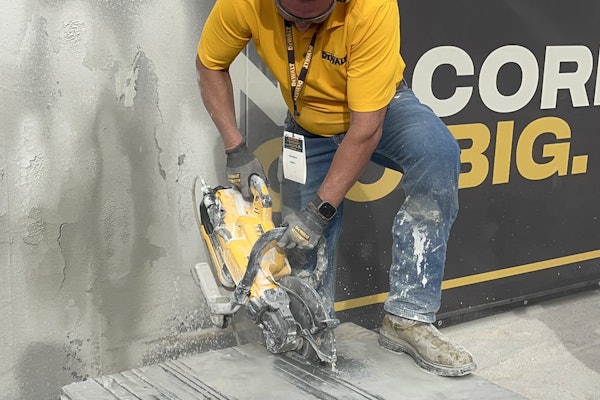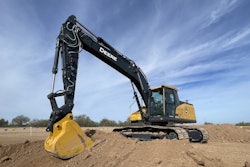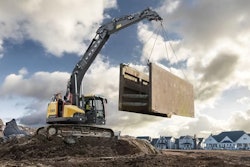Aaron Smith has been around heavy equipment all his life. When he was still in diapers, Smith regularly rode on a bulldozer with his father, often until he fell asleep. As a boy, he operated the dozer in open spaces where he couldn’t damage anything.
His father, Tommy Smith, kept his company purposefully small. Most of his jobs were one-man/one-machine subcontracted portions of large road projects. “Dad never wanted to get big,” Smith says. “He made a comfortable living and was happy with that.”
After a short stint in college, Smith went to work for his father. But because of the company’s size, there wasn’t much work in the winter. So at 22, Smith began working as safety director for Mayse Construction, a large utility contractor in Chattanooga. Four years later he left Mayse and started driving a dump truck, eventually rejoining his dad.
In 1996, Smith wanted to start his own company. At the same time his father was growing tired of the daily responsibilities of running a business, but didn’t want to retire. So the two struck a deal that benefited them both. Smith bought his father’s fleet of four machines and founded Smith Trucking and Construction in Hixson, Tennessee, just outside Chattanooga. His father now works for him part time. “It made sense,” Smith says of the decision to go into business on his own. “I had the perfect opportunity, and I had the help of the contacts Dad made.”
A new direction
Unlike his dad, Smith was not content with a small operation. In order to build an employee base, he knew his company needed to expand beyond the work his father’s business had specialized in. He immediately began branching into residential site preparation.
Smith since has been adding, on average, one full-time employee and one major piece of equipment to his company each year. Smith Trucking and Construction has gone from an annual volume of $40,000 its first year in business to $700,000 last year. The company has 11 full-time employees and three retired, part-time operators – Smith’s father and two men who worked for or with his father over the years. Smith attributes part of his success to this setup. “My guys learn from people with a tremendous amount of experience,” he says.
As of March, Tommy Smith has been operating construction equipment for half a century. The part-time operators work when they want to or when Smith needs them. “They enjoy operating machines,” Smith says. “This way they don’t have to totally give up what they did.”
A chance
The early days weren’t easy. Smith says he might not have made it if a few people hadn’t put their trust in him.
Ken Millican, now construction director for Habitat for Humanity of Greater Chattanooga, was one of Smith’s first customers. “He pretty much gave me a chance when other people wouldn’t have,” Smith says.
Acquiring quality equipment was no walk in the park either. A lot of dealers didn’t think Smith could buy anything and didn’t take him seriously. He remembers looking at a $100,000 machine and not being able to get anyone to help him. But a salesman at Stowers Machinery, a Caterpillar dealership, treated him like everyone else. Smith has bought several machines there through rental purchase options. His heavy equipment fleet consists of three dozers, two backhoes, a skid steer, a compactor, a loader and an excavator.
Rental purchase options are Smith’s preferred equipment acquisition method. They allow him to prove he can keep a machine busy enough to buy it. And he can turn most of the rental fee into a down payment.
Smith’s company did utility and road work at this Habitat for Humanity subdivision.
Hands-off approach
Finding people willing to make a career out of construction is one of the most difficult tasks Smith says he faces. The majority of young people are leaning toward college and an inside job, he says. In an effort to meet this challenge, he pays above-average wages and offers paid holidays and vacations.
Smith has found a hands-off approach to employee management works better than standing over people. “They take pride in their work,” he says. “If you leave a trusted employee alone they’ll do a better job for you.” And he never questions an employee about how long it takes to perform a particular task. He thinks that’s bad for morale. If there’s a problem, he stays at the site and helps. He also believes in keeping the atmosphere light. “Let everyone have fun,” he says. “It’s a serious business, but if you take it too seriously it’ll get to you.”
Four of Smith’s employees can operate every piece of equipment the company owns. Smith begins training newly hired laborers on the machines quickly so there will be a back-up operator on every jobsite. Three employees are dedicated truck drivers. Smith purchased Miller Trucking, a company he used to rent from frequently, in January. The previous owner now manages Smith’s trucking operations.
Smith’s wife Renee has worked full-time in the company’s office for the past four years. Before that, she worked in the accounting department of Gold Bond during the day and kept the books for her husband’s company at night. Renee is working toward an accounting degree at the University of Tennessee at Chattanooga, and is learning to estimate jobs using a software program. Smith says this will allow him to spend more time in the field.
Smith Trucking and Construction will move to a new, 3,500-square-foot facility this year. (The current office is in the Smiths’ home.) In addition to an office, the new building will have two equipment bays and room to grow.
Something new every day
Smith’s company now does everything from residential and commercial site prep to road and utility projects up to 4,000 feet long. Early this year the firm rerouted the storm drainage system under part of a shopping mall that was having flooding problems. Smith has also done at-cost work for a Habitat for Humanity subdivision, installing utilities and preparing roadbeds.
The busiest the company has ever been was last year when it was working on grading jobs in five subdivisions at one time. “The guys really stepped up to keep things going then,” Smith says.
In his spare time, Smith likes to ride street bikes. This year he fulfilled a dream by buying a 2005 Triumph, a motorcycle built in the United Kingdom. He’s owned and raced other motorcycles in the past, but sold them a couple years ago in favor of riding four wheelers for awhile. Smith is also a Formula 1 race fan and hopes to go to a race in Europe. “If it’s got a motor in it, I like it,” he says.
Now that his company has grown, Smith is leaning toward commercial projects while maintaining his residential customers. Looking to the future, he would like the firm to be somewhat larger than it is now. He might hire two employees this year instead of one because the company’s growth is beginning to snowball. The builders he works with are getting bigger, so his company has to increase in size in order to serve them.
Smith’s favorite thing about his job is that it’s not monotonous. “At the end of the day, you can see what you’ve done,” he says. “You can see progress. It’s not the same thing every day.”






